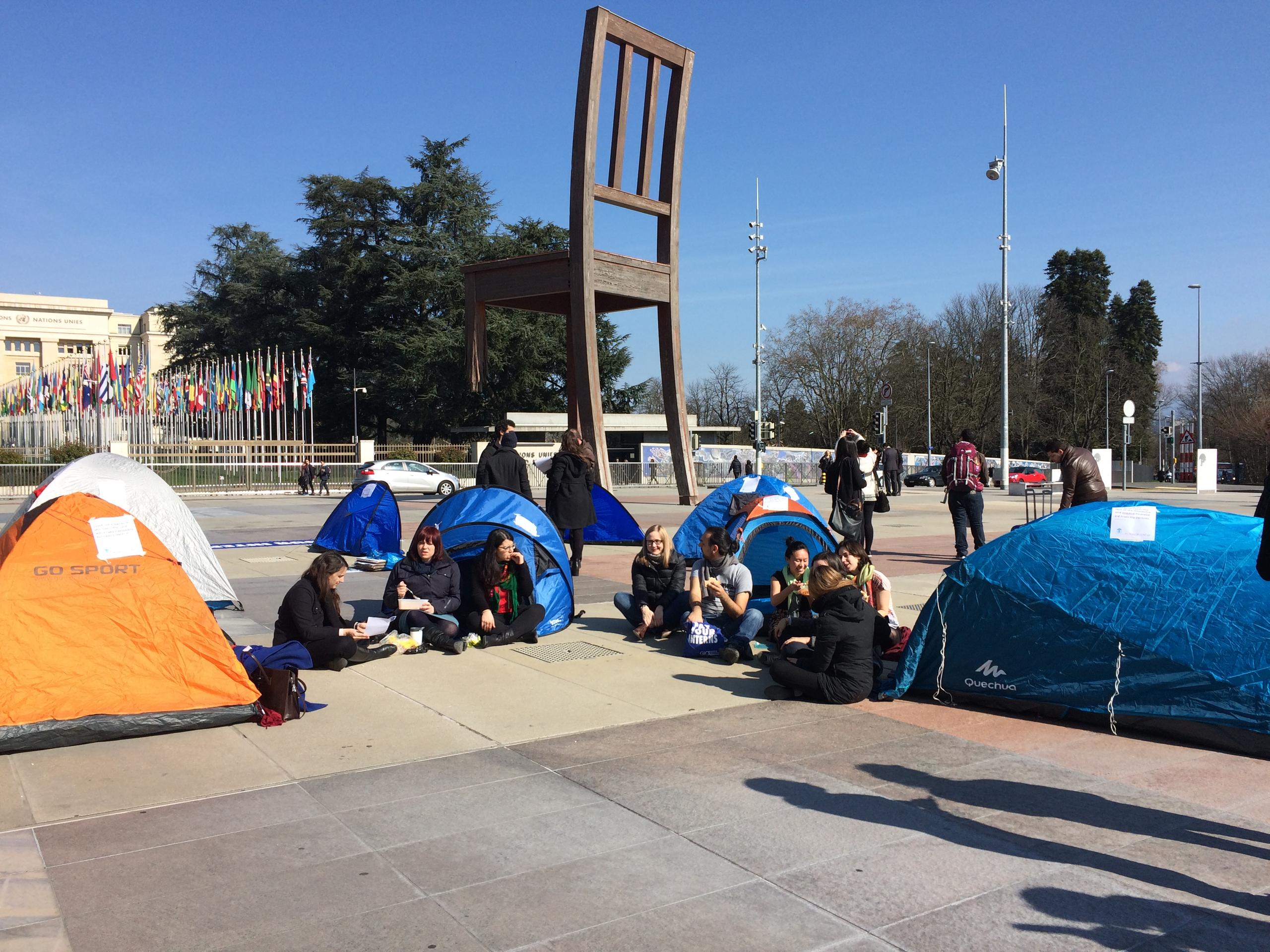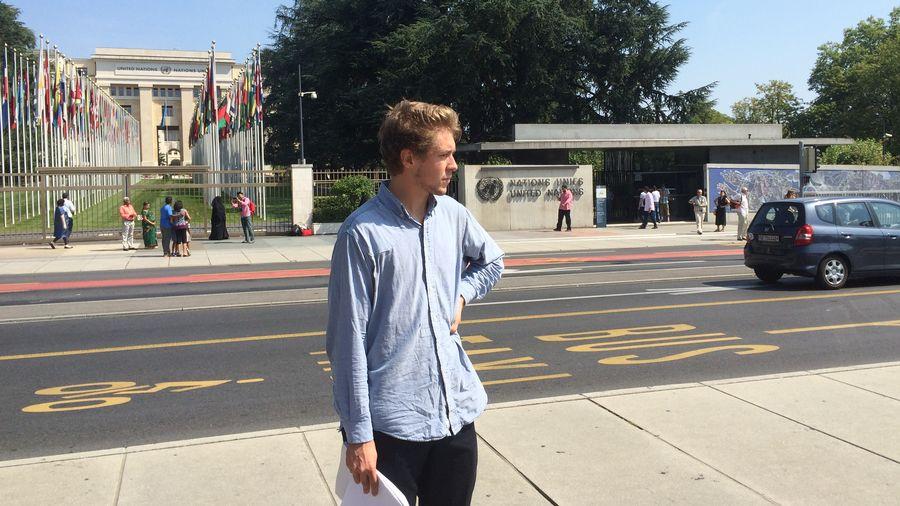
Is the situation picking up for unpaid UN interns?

The plight of unpaid interns hit the headlines last year amid uproar over a United Nations intern living in a tent in Geneva. Seven months on, the situation appears to have changed very little – or has it?
“I guess it was a good experience; you get to network and learn new things,” explains Teuta Turani, a young Albanian woman who has just finished a six-month unpaid internship at a UN organisation in Geneva.
In 2014, there were an estimated 4,000 UN interns External linkin New York and Geneva, mostly unpaid. A 2013 survey by the Geneva Interns AssociationExternal link found that 68% of interns received no salary at all.
Three months ago, Turani started a blogExternal link on Instagram and Twitter to highlight some of the issues she was facing as an unpaid UN intern in Geneva.
In her photos, she uses a pair of empty shoes to illustrate the ‘invisible’ legal status of UN interns, and the impossibility for many young people from poorer countries to work there due to the high costs.
While acknowledging that the internship has been good for her CV, Turani admits that living in one of the most expensive cities in the world and working for free has taken its toll financially.
An average Albanian citizen earns around €350 (CHF382) a month, but a six-month unpaid internship in Geneva requires a budget of at least CHF8,000 ($8,296).
“My priorities have changed,” she explains. “Initially I thought I’d stay a couple of years in the UN system. But I quickly realised that climbing the ladder in the UN is very slow and financially it was impossible.”
She has therefore decided to join the private sector to work as a business analyst.

The issue of unpaid internships has been brewing for a few years, but came to a head last August with reports splashed across front pages about David Hyde, a 22-year-old from New Zealand who worked as an intern in Geneva while living in a tent to save money (see infobox). He later admitted he chose to live in the tent as a publicity stunt to draw attention to unpaid internships.
In an interview in the Le Temps newspaper on March 26, David Hyde, the unpaid UN intern from New Zealand who hit the headlines last August for sleeping in a tent while working at the UN, said he felt vindicated in creating a global media buzz.
“That kind of staging allowed the debate to take place,” he said. “The media knew about the problem but needed an image that allowed them to grasp the issue. It showed that there was a real problem.”
He said ultimately the “UN will end up paying their interns”. “Things are moving. NGOs who never paid their interns have agreed to do so and the UN now gives interns a CHF3 reduction in their canteen. It’s a first step but this whole story has been worth it.”
New atmosphere
Seven months on, Turani is dubious real change is happening. “After the David Hyde tent story, the UN started talking about the issue much more and the atmosphere started changing. But apart from more open discussions, there have been no changes and there is no timeline with concrete steps.”
A group of young interns, students and young professionals, who came together last year under the “Pay Your Interns” banner, have nonetheless been fighting to keep the issue at the top of UN and member states’ agendas.
The “Fair Internship Initiative”External link, as it is now known, has expanded from Geneva to New York, Paris and Vienna. On March 8, young activists set up tents outside the UN in Geneva to highlight the cost-of-living problems.
The demo was well followed online but failed to grab global headlines this time around. Despite this, Matteo, an Italian who has completed five unpaid internships and is a member of the initiative, believes a certain momentum has been building since last year.
“In general, I feel organisations are becoming more uneasy about promoting unpaid internships,” he notes. “At the last UN-sponsored Economic and Social Council (ECOSOC) Youth Forum meeting in New York earlier this year, the International Labour Organisation (ILO) presented a new programme on youth employment and journalists and young people raised the issue of unpaid internships. They asked why the UN is proposing them while promoting their participation in the sustainable development goals (SDGs), and this was welcomed with huge applause.”
“Favourable support”
UN departments, unable to expand budgets and recruit staff, increasingly turn to young graduates willing to work for free for two to six months. The UN says it would like to pay interns but claims its hands are tied by a resolution passed in 1997 that forbids the payment of non-staff. The UN claims it is up to member states to change things.
Since last August, the young activists have held meetings with 15 diplomatic missions and intergovernmental organisations to push their case and have received ‘favourable support” from over half.
“In most of our meetings the member state representatives were positive, but couldn’t come out with an official position as they had to get approval from their capitals,” said Matteo.
One notable exception is the French higher education and research minister, Najat Vallaud-Belkacem, who last December wrote to UN Secretary General Ban Ki-Moon External linkdemanding a policy change.
The chicken-egg situation persists, however. The UN maintains that member states are ultimately responsible for paying interns, but has demonstrated greater openness. The UN Envoy on Youth, Ahmad Alhendawi, External linkhas met members of the Fair Internship Initiative and facilitated talks with relevant UN actors but without making any commitments.
Currently, UN human resources departments are reportedly comparing internship policies across the system and agencies. While a handful of UN agencies in Geneva like the ILO pay interns – the ILO pays CHF1,850 per month since 2011 – they are a minority.
At the same time, there have been developments outside the UN by smaller players that activists hope will create a domino effect. Last month, a group of 27 non-governmental organisations in Geneva committed to paying their interns a minimum CHF500 a month.
It is hard to say if all this will lead to a policy change, says Matteo: “The member states have shown greater openness than the UN Secretariat. We need to keep pushing strongly as these are huge administrations, which are very slow to respond to change. It will take a while. The question remains whether there is a willingness for change.”

In compliance with the JTI standards
More: SWI swissinfo.ch certified by the Journalism Trust Initiative


















![The four-metre-long painting "Sonntag der Bergbauern" [Sunday of the Mountain Farmers, 1923-24/26] had to be removed by a crane from the German Chancellery in Berlin for the exhibition in Bern.](https://www.swissinfo.ch/content/wp-content/uploads/sites/13/2025/12/01_Pressebild_KirchnerxKirchner.jpg?ver=1ea8acae)











You can find an overview of ongoing debates with our journalists here . Please join us!
If you want to start a conversation about a topic raised in this article or want to report factual errors, email us at english@swissinfo.ch.